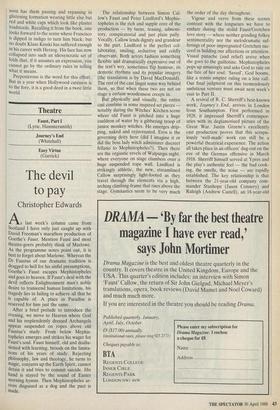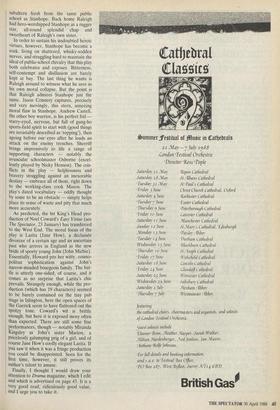Theatre
Faust, Part I (Lyric, Hammersmith) Journey's End (Whitehall) Easy Virtue (Garrick)
The devil to pay
Christopher Edwards
s last week's column came from Scotland I have only just caught up with David Freeman's marathon production of Goethe's Faust. Mention Faust and most theatre-goers probably think of Marlowe. As the programme notes point out, it is best to forget about Marlowe. Whereas the Dr Faustus of our dramatic tradition is dragged to hell for his sinful presumptions, Goethe's Faust escapes Mephistopheles and goes to heaven. If Faust's deal with the devil reflects Enlightenment man's noble desire to transcend human limitations, his tragedy lies in failing to achieve all that he is capable of. A place in Paradise is reserved for him just the same.
After a brief prelude to introduce the evening, we move to Heaven where God and his resplendently dressed Archangels appear suspended on ropes above old Faustus's study. From below Mephis- topheles emerges and strikes his wager for Faust's soul. Faust himself, old and disillu- sioned with learning, broods on the limita- tions of, his years of study. Rejecting philosophy, law and theology, he turns to magic, conjures up the Earth Spirit, cannot detain it and tries to commit suicide. His hand is stayed by the sound of Easter morning hymns. Then Mephistopheles ar- nves disguised as a dog and the pact is made. The relationship between Simon Cal- low's Faust and Peter Lindford's Mephis- topheles is the rich and supple core of the production — by turns, teasing, admoni- tory, conspiratorial and just plain pally. Vocally, Callow lends dignity and grandeur to the part. Lindford is the perfect col- laborator, smiling, seductive and coldly observant. Both actors fashion something flexible and dramatically expressive out of the text's wry, sometimes flip humour, its demotic rhythms and its popular imagery (the translation is by David MacDonald). The rest of the cast linger some way behind them, so that when these two are not on stage a certain woodenness creeps in.
But physically and visually, the entire cast combine in some inspired set pieces — notably during the Witches' Kitchen scene where old Faust is pitched into a huge 'cauldron of water by a gibbering troop of junior monkey witches. He emerges drip- ping, naked and rejuvenated. Eros is the governing deity here (did I imagine it or did the boss lady witch administer discreet fellatio to Mephistopheles?). Then there are the Orgiastic revels of Walpurgis night, where everyone on stage clambers over a huge suspended rope wall. Lindford is strikingly athletic, the new, streamlined Callow surprisingly light-footed as they travel through the elements via a high, arching climbing-frame that rises above the stage. Gymnastics seem to be very much the order of the day throughout.
Vigour and verve from these scenes contrast with the longueurs we have to endure during the stolid Faust/Gretchen love story — where neither grinding folksy sentimentality nor the melodramatic suf- ferings of poor impregnated Gretchen suc- ceed in holding our affections or attention. Visual panache (and relief) arrive when she goes to the guillotine. Mephistopheles pops up amusingly and asks God to rule on the fate of her soul: 'Saved', God booms, like a tennis umpire ruling on a line call. Our final judgment on this tremendously ambitious venture must await next week's visit to Part II.
A revival of R. C. Sherriffs best-known work, Journey's End, arrives in London from Southampton. First performed in 1928, it impressed Sherriffs contempor- aries with its deglamorised picture of the Great War. Justin Greene's excellently cast production proves that this scrupu- lously 'well-made' work can still be a powerful theatrical experience. The action all takes place in an officers' dug-out on the eve of the German offensive in March 1918. Sherriff himself served at Ypres and the play's authentic feel — the bad cook- ing, the smells, the noise — are rapidly established. The key relationship is that between the 21-year-old company com- mander Stanhope (Jason Connery) and Raleigh (Andrew Castel!), an 18-year-old subaltern fresh from the same public school as Stanhope. Back home Raleigh had hero-worshipped Stanhope as a rugger star, all-round splendid chap and sweetheart of Raleigh's own sister.
In order to sustain his undoubted heroic virtues, however, Stanhope has become a soak, living on shattered, whisky-sodden nerves, and struggling hard to maintain the ideal of pUblic-school chivalry that this play both celebrates and exposes. Bitterness, self-contempt and disillusion are barely kept at bay. The last thing he wants is Raleigh around to witness what he sees as his own moral collapse. But the point is that Raleigh admires Stanhope just the same. Jason Cindery captures, precisely and very movingly, this stern, unseeing moral flaw in Stanhope. Andrew Caste11, the other boy warrior, is his perfect bail — starry-eyed, nervous, but full of gung-ho sports-field spirit to start with .(gOod things are invariably described as `topping'), then ageing before our eyes after he leads an attack on the enemy trenches. Sherriff brings impressively .W life a range of supporting Characters — notably the avuncular schoolmaster Osborne (excel- lently played by Nicky Henson). The con- flicts in the play — helplessness and bravery struggling against an inexorable destiny — embrace all of them, right down to the working-class cook Mason. The play's dated vocabulary — oddly thought by some to be an obstacle — simply helps Place its sense of waste and pity that much more accurately.
As predicted, the hit King's Head pro- Auction of Noel Coward's Easy Virtue (see The Spectator, 23 January) has transferred to the West End. The moral focus of the play is Larita (Jane How), a declass& divorcee of a certain age and an uncertain Past who arrives in England as the new bride of sporty young John (John Michie). Essentially, Howard pits her witty, cosmo- Politan sophistication against John's narrow-minded bourgeois family. The bat- tle is utterly one-sided, of course, and it comes as no surprise that Larita's chic prevails. Strangely enough, while the pro- duction (which has 19 characters) seemed to be barely contained on the tiny pub stage in Islington, here the open spaces of the Garrick seem to have flattened out the spritzy tone. Coward's wit is brittle enough, but here it is exposed more often than expected. There are still some fine performances, though — notably Miranda Kingsley as John's sister Marion,. a Pricelessly galumping prig of a girl, and of course Jane How's coolly elegant Larita. If You saw it when it was a fringe production You could be disappointed. Seen for the first time, however, it still proves its author's talent to amuse.
Finally, I thought I would draw your attention to Drama magazine, which I edit and which is advertised on page 43. It is a very good read, ridiculously good value, and I urge you to take it.



























































 Previous page
Previous page